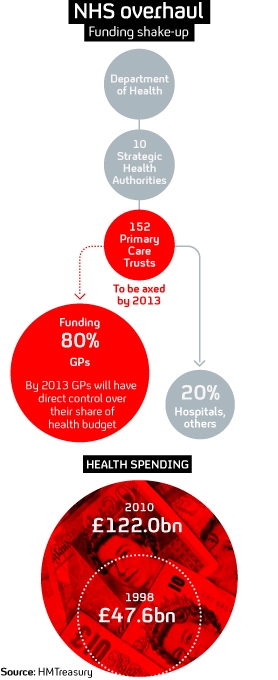BMA warns of ‘potentially damaging’ NHS shake-up
The BMA tells Channel 4 News that Government plans for an overhaul of the NHS could lead to doctors being “pitted against one another”.
The British Medical Association says the government’s plans for a market-based approach to the NHS could destabilise the long term future of health care.
Under proposals set out in Health Secretary Andrew Lansley’s White Paper in July, GPs are to be given control over much of the health budget which is currently handled by primary care trusts.
150 primary care trusts would be scrapped, along with 10 larger regional management bodies and thousands of managers.
Under the plan, patients will also be able to choose which GP they register with, regardless of practice boundaries.
Despite cautiously welcoming the plans, the BMA now says there are “fundamental concerns” about the effects of a market-based approach to health care.
“We urge the Government and NHS organisations to focus on those areas where they can truly eliminate waste and achieve genuine efficiency savings rather than adopt a slash-and-burn approach to health care…” Dr Hamish Meldrum, BMA Council Chairman
“There are proposals in the White Paper that doctors can support and want to work with. But there is also much that would be potentially damaging,” BMA Council Chairman, Dr Hamish Meldrum, said.
“The BMA has consistently argued that clinicians should have more autonomy to shape services for their patients, but pitting them against each other in a market-based system creates waste, bureaucracy and inefficiency.
“We urge the Government and NHS organisations to focus on those areas where they can truly eliminate waste and achieve genuine efficiency savings rather than adopt a slash-and-burn approach to health care with arbitrary cuts and poorly considered policies.”
The BMA has also questioned the timing of the overhaul, and says it could affect the £20bn savings the NHS has been asked to make by 2014.
The Deputy Chair of the BMA’s consultancy committee, Dr Keith Brent, told Channel 4 News that an “integrated” approach is needed between doctors and consultants.
“We think that frontline clinicians, doctors, GPs and consultants working together should be better placed to make those decisions for the benefit of patients, with the support of good managers of course.”
Dr Brent said that while he welcomes moves to give doctors more control, there are broad concerns a market-based approach could see doctors pitted against each other.
“We’re not going to let competition simply divide everyone up against one another.” Health Secretary Andrew Lansley
“Patients need to know that people know and understand the system, and that the various doctors they interact with are actually working with each other and not against each other. We think it’s a mistake to consider health care and patients as some sort of commodity that can be essentially be traded or bought and sold.
“A market-based approach based on competition, with the idea that somehow competition will necessarily drive up quality, we’re unconvinced by that. We think that might work for some aspects of health care, but we’re unconvinced that it will work overall for health care.

Who controls the funds?
Under the current set-up, there are 10 Strategic Health Authorities (SHAs) and 152 Primary Care Trusts (PCTs).
About 80 per cent of the health budget is currently controlled by local managers in these trusts. They are in charge of commissioning local services, including GPs, hospitals, community clinics and mental health services.
But when PCTs are phased out by 2013, GPs will gain direct control over how health funding is spent.
NHS spending has grown significantly in the last decade. In 1998 the government spent £47.6bn on health. While this year's budget has committed £122bn to health spending.
The Health Secretary Andrew Lansley has rejected the BMA’s claims that competition could threaten health care. He told Channel 4 News that “competition will raise standards”.
“We’re not going to let competition simply divide everyone up against one another. We are going to make sure that the system itself uses the widest range of providers who are held to account for the quality of what they do, who realize that if they produce greater efficiencies and quality, patients will go to them instead of someone else they’re told to go to.
One Essex-based GP, Dr Timothy Bland, told Channel 4 News the plans would mean that the State would “give up all control” of the NHS.
“I think it will undermine patient care in two important ways,” he added. “Firstly, it will divert GPs’ time and attention away from patients and on to the massive task of corporate reorganisation, for which they are not equipped.
“Secondly, it will seriously undermine the trust between GPs and patients which is fundamental to the success of British health care.”
The BMA’s response comes as the government faces a legal bid from public sector union Unison to block the changes.
Ministers are expected to start formal talks with BMA negotiators about the changes after the official consultation period ends later this month.
-
Latest news
-
Year of civil war in Sudan ‘a nightmare of hunger and displacement’4m

-
Israel fears repeat Iran attack, says former editor of Jerusalem Post4m

-
How long could it take to clear the Rwanda asylum seeker backlog?3m

-
Rwanda asylum boost for Sunak as bill expected to become law2m

-
Donald Trump trial: day one of historic Stormy Daniels court case4m

-




